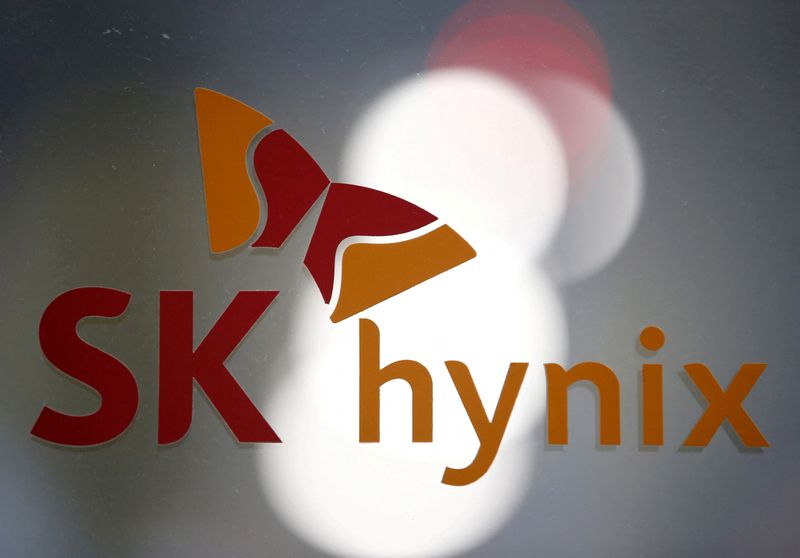SK Hynix to break ground on new U.S. chip packaging plant early next year – sources
2022.08.12 03:21

FILE PHOTO: The logo of SK Hynix is seen at its headquarters in Seongnam, South Korea, April 25, 2016. REUTERS/Kim Hong-Ji
By Alexandra Alper
WASHINGTON (Reuters) – South Korea’s SK Hynix aims to select a U.S. site for its advanced chip packaging plant and break ground there around the first quarter of next year, two people familiar with the matter said, helping the United States to compete as China pours money into the burgeoning sector.
The plant, whose estimated cost would be “several billions,” would ramp up to mass production by 2025-2026 and employ about 1,000 workers, one of the sources said, declining to be named because the details surrounding the plant have not been made public.
It would likely be located near a university with engineering talent, the person added.
South Korea’s second-biggest conglomerate SK Group, which owns one of the top memory chipmakers SK Hynix, announced the new plant last month as part of a $22 billion U.S based investment package in semiconductors, green energy and bioscience projects. The announcement, heralded by the White House, allocates $15 billion to the semiconductor industry through research and development programs, materials, and the creation of an advanced packaging and testing facility.
“R&D investments will include building out a nationwide network of R&D partnerships and facilities,” the sources said, adding that the advanced packaging facility would package SK Hynix’s own memory chips with logic chips designed by other U.S. companies for machine learning and artificial intelligence applications.
In a statement to Reuters, SK Hynix did not specifically address the new details about the plant but said that of the recently announced investment,”$15 billion will be invested in advanced packaging and other semiconductor-related R&D, of which details have not been decided yet.”
The United States long ago ceded most basic, low value chip packaging operations to overseas factories mostly in Asia, where chips are placed into protectives frames which are then tested before being shipped to electronics manufacturers.
But fresh battle lines are being drawn in the race to develop advanced packaging techniques, which involves placing different chips with different functions into a single package, enhancing overall capabilities and limiting the added cost of more advanced chips.
“While the United States and its partners have advanced packaging capabilities, China’s massive investments in advanced
packaging threaten to upend the market in the future,” the White House said in a 2021 report.
An executive at China’s top chipmaker SMIC, which was added to a U.S. trade blacklist in 2020, said last year that Chinese companies should focus on advanced packaging to overcome their weaknesses in developing more sophisticated chips, the report added.
The SK move comes after Biden signed into law the CHIPS Act this week, providing $52 billion in subsidies for chip manufacturing and research, as well as an estimated $24 billion investment tax credit for chip plants. The sources said both the R&D facilities and the chip packaging plant would qualify for the funding.
The announcements also comes amid a flurry of expansion plans announced by chipmakers in the United States in recent years, from Taiwan Semiconductor Manufacturing Co. to Samsung (KS:005930) and Intel (NASDAQ:INTC).








